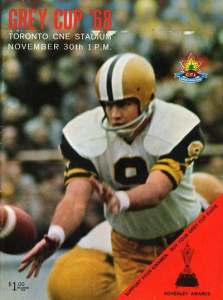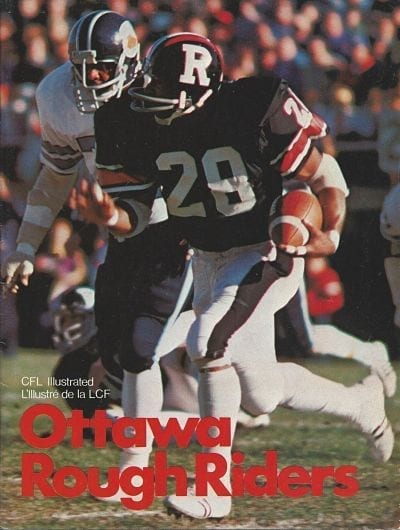Ontario Rugby Football Union (1898-1902)
Quebec Rugby Football Union (1903-1906)
Interprovincial Rugby Football Union (1907-1957)
Canadian Football League (1958-1996)
Tombstone
Born: September 19, 1876 (as the Ottawa Football Club)1Today in Ottawa’s History, Sep. 10, 2022
Folded: November 6, 19962CFL Revokes Franchise from Ottawa Owner, AP via The Rome News-Tribune, November 7, 1996
First Game: September 23, 1876 (W vs. Aylmer Football Club)3Today in Ottawa’s History, Sep. 10, 2022
Last Game: November 2, 1996 (L 35-24 @ B.C. Lions)
Grey Cup Championships: Nine (1925, 1926, 1940, 1951, 1960, 1968, 1969, 1973, 1976)
Stadium
Lansdowne Park/Frank Clair Stadium (30,927)41995 Canadian Football League Facts, Figures & Records
Opened: 1908
Branding
Team Colors:[mfn]TruColor.net[/mfn]
- Red, White, and Black (1936-1991)
- Black, Red, Silver, and White (1992-1993)
- Red, Blue, Gold, and White (1994)
- Black, Red, and White (1995-1996)
Ownership
Owners:
- 1936-1959: “Informal community ownership”5Glory, failure equal parts of Riders history”, The Ottawa Citizen, November 7, 1996
- 1959-1966:
- 1966-1969: Gordon Henderson, Bill Teron, Maurice Strong, David Loeb, Don McLean, Sam Berger, et al.6Glory, failure equal parts of Riders history”, The Ottawa Citizen, November 7, 1996
- 1969-1977: David Loeb
- 1977-1987: Allan Waters
- 1987-????: Travis Price, Winfield Kennedy & Limited Partners
- July 1991 – October 1991: Canadian Football League
- 1991-1993: Bernie Glieberman & Lonie Glieberman
- 1994: Bruce Firestone
- 1995-1996: Horn Chen
Background
The history of the Ottawa Rough Riders Canadian football team stretches back to 1876 with the formation of an amateur rugby side known as the Ottawa Football Club. But since we tend to peg our team histories to the adoption of specific names and identities, we’ll begin in 1898 when the Ottawa Football Club changed its name to the Rough Riders.
Over the first half of the 20th century the Rough Riders and their competitors in the various regional rugby football unions of Canada began a slow evolution towards today’s Canadian Football League. Competition for the Grey Cup trophy between amateur clubs and collegiate squads from Ontario and Quebec commenced in 1909. Teams from western Canada joined the competition for the Cup in 1921.
Ottawa won its first Grey Cups in back-to-back seasons in 1925 and 1926 during a brief interregnum when the team was known as the Ottawa Senators.
Progress rolled on. The forward pass was introduced to Canadian football in 1929. Professionalism accelerated in the years after World War II, culminating in the formation of the modern-day Canadian Football League in 1958 with the Rough Riders as a founding member.
Glory Years
The Rough Riders best years came during the 1960’s and early ’70s as the club won five Grey Cups under the leadership of Frank Clair. Clair arrived in 1956 with two Grey Cup’s under his belt from an earlier sting with the Toronto Argonauts. Clair would coach the Riders to three titles before stepping down in 1969. As the team’s general manager, Clair put together two more championship Riders teams in 1973 and 1976.
Ottawa won its first Grey Cup of the CFL era in 1960. The 1960 squad was blessed with a pair of talented young quarterbacks in Ron Lancaster and Russ Jackson. Both were future Hall of Famers. Lancaster saw the bulk of the action in 1960 as the Riders finished 9-5 and beat the Edmonton Eskimos 16-6 in the Grey Cup final.
 The duo platooned under center through the 1962 season. In 1963 Ottawa sold Lancaster to the Saskatchewan Roughriders, allowing Jackson to fully emerge as the top CFL signal caller of the 1960’s. Jackson earned the CFL’s Most Outstanding Player Award in 1963, 1966 and 1969.
The duo platooned under center through the 1962 season. In 1963 Ottawa sold Lancaster to the Saskatchewan Roughriders, allowing Jackson to fully emerge as the top CFL signal caller of the 1960’s. Jackson earned the CFL’s Most Outstanding Player Award in 1963, 1966 and 1969.
The Riders won back-to-back Grey Cups to close out their greatest decade. They edged out the Calgary Stampeders 24-21 in 1968.
The 1969 Grey Cup, played at Montreal’s Autostade on November 30, 1969, would be both Clair’s final game as head coach and Jackson’s final appearance as a player. In a fitting conclusion, Ottawa defeated the Saskatchewan Roughriders, quarterbacked by former compatriot Ron Lancaster, 29-11. Jackson threw four touchdown passes and was named the game’s Most Valuable Player.
Last Hurrah: The 1981 Grey Cup
Two years after Ottawa’s final Grey Cup victory in 1976, the Rough Riders pushed 61-year old Frank Clair out of the general manager’s chair in late 1978. The Riders posted one more winning campaign in 1979 (8-6-2) and then embarked on a two-decade run of competitive futility and economic despair.
From 1980 to 1996, the Rough Riders failed to post a winning record for 17 straight seasons.
But the Riders had a strange last hurrah of sorts in 1981. Ottawa finished in 2nd in an historically weak East Division with a lousy 5-11 record. The Riders won two playoff contests and earned the right to face the three-time defending champion Edmonton Eskimos in the final at Montreal on November 22. Ottawa entered the game with the worst record of any Grey Cup finalist in CFL history. Bookmakers rated the Riders a 22 point underdog.7United Press International. “A classic mismatch in today’s Grey Cup.” The Tampa Bay Times. November 22, 1981
The game turned out to be a classic. The Riders took a 20-0 first half lead and never trailed … until Eskimos kicker Dave Cutler booted the game-winning field goal with three seconds left. Edmonton outscored Ottawa 25-3 in the second half. Ottawa’s Hall-of-Fame tight end Tony Gabriel, playing his final game in a brace with damaged knee ligaments, competed heroically catching 6 passes for 76 yards. A critical seventh reception in the final minutes was called back on a controversial off-setting pass interference call on Gabriel and Esks’ defensive back Gary Hayes, helping enable Edmonton’s comeback.
In a strange post-script to the game, Ottawa’s rookie quarterback J.C. Watts was named the game’s offensive MVP. Watts played for the losing team, threw three interceptions, rushed for only 29 yards, and produced no touchdowns either passing or rushing.
The End
The 1980’s brought relentless losing on the field and crushing debt off of it. Owner Allan Waters, after losing $13 million on the team since taking over in 1977, relinquished the Riders for the price of $1.00 to a sprawling group of limited partners in 1987. The partners were desperately under-capitalized and burned through their funds in less than a year. A series of emergency bailouts from the local government and the CFL followed to keep the team afloat through the late 80’s and early 1990’s.
During the Riders’ final four seasons from 1993 to 1996 the team cycled through three owners and went 14-58.
The Riders’ final owner was a Chicago sports investor named Horn Chen who owned a sprawling portfolio of minor league teams and leagues in the United States. Chen was a true absentee who reportedly never attended a Rough Riders game during the two years he owned the team in 1995 and 1996. Chen was so reclusive that The Ottawa Sun claims to have hired a private detective to prove that he actually existed.8Baines, Tim. “Former Rough Riders owner Horn Chen dies.” The Ottawa Sun. December 11, 2015
Well, Chen did exist. But he may as well not have, as far as the Riders and the CFL were concerned. Chen walked away from the club during the 1996 season. The CFL and Ottawa politicans, exhausted from years of concessions and rescue packages, let the team die in late 1996 ending a 120-year sports heritage.
The CFL has returned twice to Ottawa since the death of the Rough Riders in 1996. The Ottawa Renegades (2002-2005) were a short-lived failure. The Ottawa Redblacks, formed in 2014, have restored some lustre to the city’s football heritage. In 2016 the Redblacks won the Grey Cup, returning the trophy to Canada’s capital for the first time since 1976.
Trivia
The Rough Riders’ historic home stadium at Lansdowne Park was re-named Frank Clair Stadium in 1993. The former Lansdowne Park is still in use today by the CFL’s Ottawa Redblacks and is now known as TD Place under a 2014 naming rights deal.
In Memoriam
Canadian Football Hall of Fame coach and general manager Frank Clair died of congestive heart failure on April 3, 2005 at the age of 87. CBC obituary.
Linebacker Rick Sowieta (Rough Riders ’79-’86) died following a battle with pancreatic cancer on August 26, 2017. The three-time CFL Eastern All-Star selection was 63 years old. Ottawa Citizen obituary.
George Brancato, a defensive back for the Riders from 1957-1973 and the team’s head coach from 1974-1984, passed away on October 22, 2019 at age 88. Ottawa Sun obituary.
Links
###


5 Responses